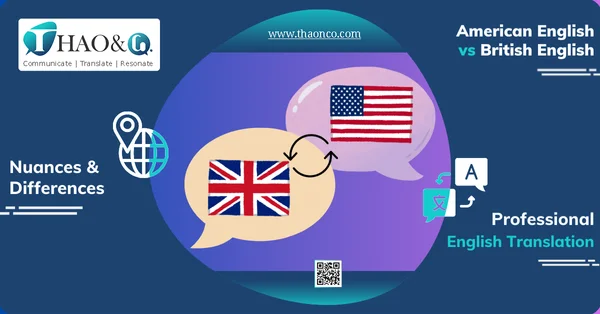British English and American English are the two most widely recognized dialects of the language. They are distinct in various aspects, including grammar.
In this article, Thao & Co. answers these questions:
British English boasts more than 60 million native speakers. However, American English takes the spotlight with more than 225 million speakers around the world.
This significant difference is largely due to the global influence of America’s economy and culture.
In addition, major tech companies like Facebook and Google, as well as international news outlets, tend to favor American English. These factors have helped propel US English to its dominant position worldwide.
Nevertheless, British English remains popular in the UK and across 54 Commonwealth countries, retaining distinctive characteristics that set it apart.
Many education systems, from Europe to Asia, also lean towards UK English.
UK English and US English mainly differ in vocabulary, grammar, and pronunciation.
The same object or concept often has a different word in British and American English.
These differences are rooted in the distinct historical, economic, cultural, political, and religious developments of the two nations.
For example:
One reason for this contrast is the historical differences in culture and economics between the UK and the US.
Pronunciation differences are one of the most noticeable aspects that set these dialects apart:
+ Pronunciation of English /r/: In UK English (specifically Received Pronunciation), the /r/ sound is not pronounced unless followed by a vowel (also known as R-dropping). In contrast, most American English dialects pronounce the /r/ sound regardless of its position.
+ Pronunciation of English /t/: In US English, when a /t/ sound occurs between vowels, it often sounds more like a soft /d/ due to a process called “T-flapping.” UK English speakers typically enunciate this sound.
+ Vowels: British English tends to use long vowels more frequently than American English. For example, “bath” is pronounced /bɑːθ/ in British English. American English prefers short vowels, hence “bath” is pronounced /bæθ/.
Another key difference between British and American English lies in their use of tenses, prepositions, and sentence structures. Here are some of the main distinctions:
+ Use of tenses: The present perfect tense connects past events to the present. In British English, it is often used to describe recent actions with present relevance. American English, however, frequently uses the simple past in these cases.
+ Preposition: There is a subtle difference in the prepositions used to describe time, particularly around weekends.
+ Articles:

Differences in word usage between British English and American English can be observed across various categories:
| Concept | British English | American English |
|---|---|---|
| Transportation | ||
| A place to park your car | Car park | Parking lot |
| A machine that carries you to a higher or lower level of a building | Lift | Elevator |
| A large vehicle that carries bulky goods | Lorry | Truck |
| A four-door and closed-body vehicle | Saloon | Sedan |
| Cuisine | ||
| A baked cake that is small, dry, and crisp | Biscuit | Cookie |
| A strip of potato baked or fried in oil | Chips | Fries |
| A type of green or yellow summer squash with edible rind and seeds | Courgette | Zucchini |
| Sugary confectionary | Sweets | Candy |
| A small and round piece of bread | Bread roll | Roll |
| Clothes | ||
| A knitted, long-sleeved top worn for warmth | Jumper | Sweater |
| A piece of clothing worn on the upper part | Shirt (mainly refers to a button-down collar garment, commonly seen in menswear) |
Shirt (any upper body garment including shirts, T-shirts, and similar articles of clothing) |
| Accommodation | ||
| A set of rooms on one floor | Flat | Apartment |
| A room for relaxation, entertainment, and guest reception | Sitting room | Living room |
| Health | ||
| A drug store | Chemist | Pharmacy |
| The part of a hospital where injured people or those requiring urgent care are treated | A&E (Accident and Emergency) |
ER (Emergency Room) |
| Entertainment | ||
| A team sport in which players from one team kick a ball into their opponent team’s net | Football | Soccer |
| A recording of moving images and sounds | Film | Movie |
| A place where films/movies are shown | Cinema | Theater |
| Education | ||
| A period of an academic year | Term | Semester |
| A school for children from ages 5 to 11 | Primary school | Elementary school |
| A school beyond the primary school level for adolescents | Secondary school | High school |
Understanding the differences between British English and American English is crucial for high-quality translation. Recognizing these distinctions helps translators in several ways:
A firm grasp of which features are exclusive to British or American English helps translators choose the most suitable words. Words that seem identical may have different meanings.
For example: In British English, “boot” commonly refers to the storage compartment of a car. In American English, it denotes a type of footwear that covers the foot and lower part of the leg.
Differences in grammatical structures also present potential barriers to a good translation. Therefore, translators need thorough research to prevent miscommunication.
In translation or interpretation, the right variety of English facilitates comprehension and connection.
For example: marketing materials targeting the US market should be translated into American English.
Tailoring the writing style to suit each market can make the translation resonate more deeply with readers. For example:
By adapting language for different markets, translators also perform localization in addition to translation or interpretation. Learn how localization helps connect your brand with your audiences!
Specialized fields, such as law, technology, and healthcare, require absolute accuracy in the translation to ensure consistency and appropriateness.
In specialized English translation, translators might need to prioritize one variant of English depending on the local audience. It is essential to choose the most appropriate terminology to avoid disputes and uphold legal validity.
Specialized terminology may vary between British English and American English.
For example:
For the concept of “an official document that gives permission” and “the decision of a court or a judge,”
These are notable differences between British English and American English. Such linguistic nuances, if not properly localized, can negatively affect user experience.
Mastery of these dialect-specific features is crucial for accurate translation. With a deeper understanding of linguistic variations, translators can produce accurate translations that meet both legal standards and resonate with target audiences.
At Thao & Co., we’re proud to be a leading provider of English translation services. Our skilled team of linguists has built on years of experience across various fields.

Beyond translation, our localization services tailor your brand to each target market, fostering genuine connections with local customers. Choose Thao & Co. translation company today for a seamless experience that guarantees quality beyond excellence.
Ready to Kickstart Your Success? Head to our Get a Quote page to learn more about our English translation and interpretation services. A free personalized consultation is just a few clicks away!